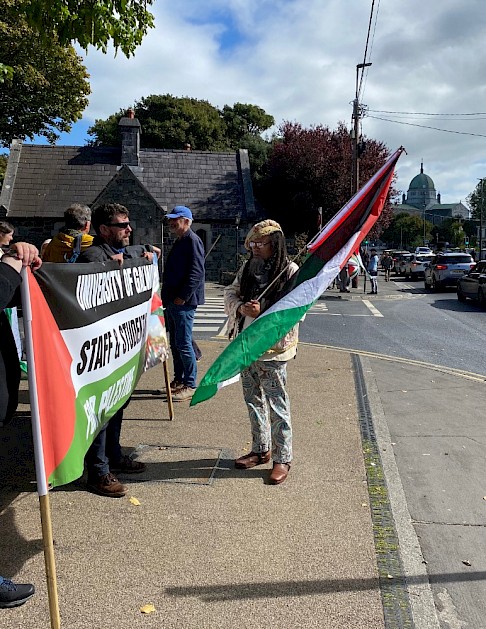First Time at a University Demonstration for Palestine
The first time I tried to join a demonstration for Palestine, I bottled it.
I recall a windy, sunny day in town. People huddled and chatting, billowing flags in green, red and white, all crowded onto the footpath across the bridge.
I was not sure of the protocol. The Instagram post had just said ‘Demonstration! 3pm’. I walked up and stood for a few moments beside one of the flag holders. Shoppers skirted around us on their way up the hill.
I looked at my neighbour. He was saying nothing.
Maybe he knows this is my first time demonstrating even though the attacks – these attacks -- have been going on since October last year. He knows I am not a real activist.
I made a noise like ‘whoops’, a half-cough, and kept on walking.
*
A group of colleagues have been gathering at the University of Galway gates from 1pm to 2pm every Wednesday; the staff-student protest against Palestine. I decided to try again. Perhaps silence and feeling awkward is the way it goes with protests. They are serious business, after all. But walking over, I see someone I know. A smile and nod, which I return. I commence the standing.
You can see the cathedral from the University gate. The cathedral was, once upon a time, the prison in The Fields of Athenry, that song about the local farmer sentenced to servitude in Australia by the colonizers, for stealing a bit of corn. Its oversized dome is on the postcards of Galway.
People hustle by on the pavement, rushing to meet the promise made for 1pm. Cars drive by that do not beep. Drivers looking over, craning necks. But others do beep. And wave. Taxis are the best for the beeps. And the smaller cars.
One woman in a navy raincoat flies by on a high-nelly: her bicycle bell a little yellow rubber duck with an orange beak. Quack quack: she squeezes it, beaming our way.
Some people have flags. Others just stand. One lecturer keeps six flags in his office and brings them down every Wednesday to share around. People take turns because the poles are heavy. In the wind, the flowing fabric swirls over the pavement. If a passer-by’s face is accidentally grazed, a frown can result. Which feels intrusive but oddly purposeful.
*
A woman beside me holds a green, red and white umbrella horizontally, twirling circles. There were meant to be more students here today, she tells me. It’s a pity.
I nod. It would be good to have a bigger showing. I just passed a queue of students outside the kebab shop on my way here, I tell her. People looked like they’d been standing half an hour. Two-for-one lunch deal, she says. College is not cheap.
We agree they should move this protest to outside the kebab shop, next time. We stand some more without talking.
A few days later I co-hosted feminist academic Lynne Segal at an online reading group. No stranger to picket lines herself. We discussed her latest book, Lean On Me. “We revel in some sense of shared exuberance, however transitory,” she writes, “whenever we collectively resist injustice or harms towards others… on picket lines or in other common spaces’.
*
The umbrella lady and I talk about the six-one news yesterday. Simon Harris’s outrage and children being killed. We talk about the Shannon weapons flights that are happening anyway. We don’t do the summary thing where you resolve the ambiguity for the sake of closing the conversation. There it sits.
Leaves swirl. It is colder than it was two weeks ago. I check out people’s footwear. I am not the only one in Converse. We won’t make that mistake next time.
*
I had asked one of our students who is from Palestine to come along today. ‘Thank Kate for letting me know. Such actions don't put pressure on the government only but also give us a hope that we are not alone. The war is escalating into Lebanon, and now, after around a year of consistent and unbelievable massive genocide and destruction in Palestine, no entity on this earth has said "stop the war" and taken serious actions to stop it. Therefore, it will continue expanding on the same level as long as the US and some countries are fueling the war, directly or indirectly. Anyway, let's hope for a peaceful future Thank you again 🙂 H…’
I only make it in to this protest every couple of weeks.
*
Now it is almost two o’clock and people have started to smile and nod and hand back their flags, wandering off to rejoin the university afternoon.
As we move, a passer-by stops to explain why he is against the war. But it’s complex, he says; there are a lot of snipers.
I invite him to join the gathering next time. He doesn’t respond to this. What you should be doing, he says, is not standing here, but contacting your politicians. Votes is where it hurts.
Has he contacted his politicians?, I ask him.
No.
I hadn’t contacted my politicians either. But I have now. And I am going to buy a flag.
(Kate Kenny, September 2024)
